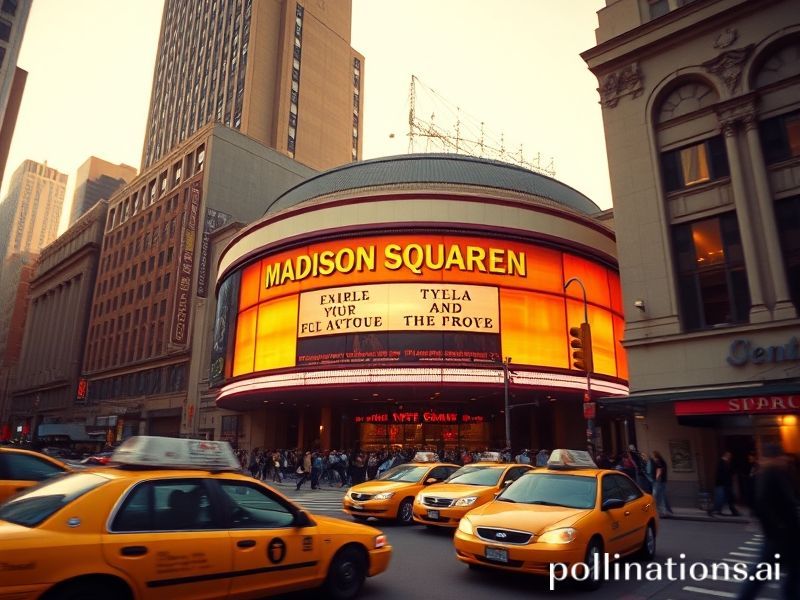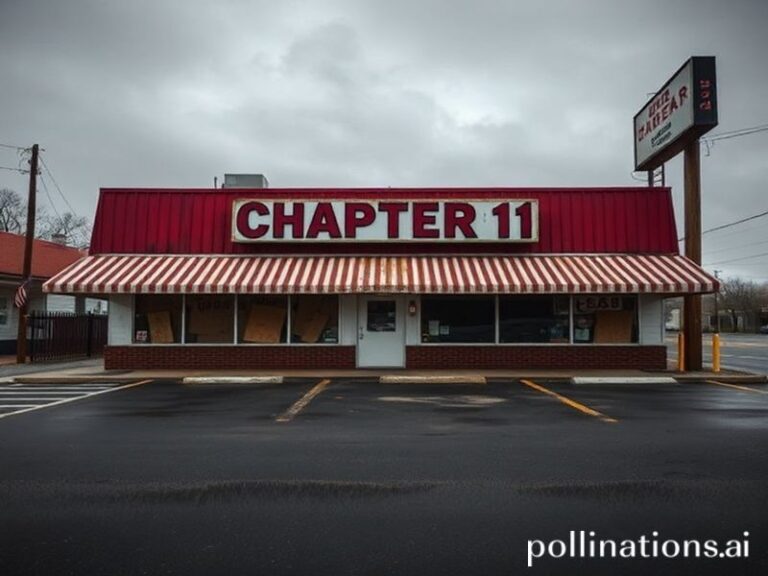Madison Square Garden: The World’s Most Expensive Town Hall Where Everyone Pays Rent
The Geopolitics of Glitter: Madison Square Garden as Planet Earth’s Loudest Embassy
By Our Man in the Cheap Seats, somewhere above Section 412, nursing a US$17 bottle of water
From the outside, Madison Square Garden looks like a brick-and-mortar shrug at the skyscraper orgy surrounding it—an unimpressive box that swallowed a city block and never said thank you. Yet diplomats, despots, and day traders all understand that when the lights dim inside, the building becomes something akin to a temporary United Nations with worse acoustics and better beer. One night it hosts a papal mass; the next, a Russian oligarch’s prize fighter rearranges another man’s dental work for the edification of 20,000 iPhones. It is, in short, the only place where sanctions, sequins, and sweat can plausibly share the same billing.
MSG’s influence radiates outward like a half-price happy-hour special. When the Knicks lose—an event as reliable as Swiss trains—global sports-betting markets twitch from Macau to Malta. A single Garden rumor about a torn ACL can erase eight-figure sums faster than a central-bank press conference. Meanwhile, television rights for a Rangers playoff game are bartered in Singapore boardrooms like microchips: same commodity fetish, slightly more blood.
Then there’s the soft-power angle. In 1971 the “Fight of the Century” between Ali and Frazier doubled as a Cold War proxy bout; delegations from newly decolonized nations watched two Americans bludgeon each other for the symbolic right to define “freedom.” Fast-forward to 2024: Ukrainian flags flutter beside NBA banners, and every Taylor Swift bracelet becomes a wearable petition against authoritarian heartbreak. The Garden doesn’t just reflect global narratives—it monetizes them in real time, 19,500 seats at a pop.
Of course, no empire runs on symbolism alone. The Dolan family, MSG’s stewards, have turned civic landmark into private fiefdom with the ruthless efficiency of a hedge fund gutting a pension plan. Tax breaks? Generous. Public transit upgrades? Let the plebeians take the 1 train. Meanwhile, the Sphere—MSG’s new LED carbuncle in Las Vegas—threatens to beam ads for luxury watches into the ionosphere, in case the aliens weren’t already depressed enough about Earth.
The building’s revolving-door calendar provides a crash course in planetary priorities. One week it’s the Westminster Kennel Club Dog Show, where pampered Pomeranians receive better healthcare than most Americans. The next, a climate summit is held on the event level, conveniently located two floors above a diesel-guzzling Zamboni polishing Rangers ice. The cognitive dissonance is so thick you can spread it on a US$9 pretzel.
MSG’s international visitors arrive in waves, each carrying a distinct moral luggage allowance. European soccer ultras fly in to lecture New York fans on “authentic atmosphere,” then spend the match filming vertical videos for TikTok. Asian pop groups sell out shows in six minutes, prompting Ticketmaster to invent new categories of disappointment. And whenever a Canadian team plays, the Garden politely forgets it is technically enemy territory; beer lines become impromptu NAFTA summits, minus the tear gas.
Security, naturally, is a growth industry. Metal detectors calibrated to catch brass knuckles, but somehow miss the brass of the visiting dignitary. MSG’s facial-recognition system—originally pitched as anti-terror tech—now moonlights as a celebrity early-warning network, alerting P.R. teams before a Kardashian has even located her seat. Somewhere in Langley, a junior analyst is updating a spreadsheet titled “Pop Star: Threat Level Bubblegum Pink.”
Yet for all its mercenary instincts, the Garden still stages moments of unscripted grace: a Puerto Rican boxer dedicating victory to an island still rebuilding; a Korean boy-band member speaking broken English to a girl from Queens who learned Korean on Duolingo; Knicks fans chanting “Defense!” with the fervor of people who’ve realized it’s the only civic service still within budget. These vignettes don’t redeem the place—they merely complicate the invoice.
As the final buzzer echoes and another crowd spills into Penn Station—humanity’s most efficient proof that purgatory has Wi-Fi—MSG reverts to its default state: a dormant spaceship fueled by nostalgia and usurious concessions. Somewhere across the globe, a kid in Lagos streams last night’s highlight, a broker in London hedges against next week’s loss, and a dictator in a distant capital wonders if booking the arena might buy him a sliver of legitimacy. The answer, like the building itself, is loud, expensive, and never quite what it seems.







